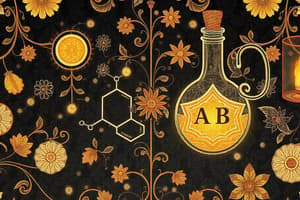Podcast
Questions and Answers
What type of elements typically form Ionic Compounds?
What type of elements typically form Ionic Compounds?
- Alkali metals and alkaline earth metals
- Noble gases and halogens
- Transition metals and metalloids
- Metals and nonmetals (correct)
What is the role of metals in the formation of Ionic Compounds?
What is the role of metals in the formation of Ionic Compounds?
- They make up the anion, or negatively charged portion
- They have the highest electronegativity
- They make up the cation, or positively charged portion (correct)
- They completely accept electrons from nonmetals
What happens to the electron configuration of a metal when it forms a cation in an ionic bond?
What happens to the electron configuration of a metal when it forms a cation in an ionic bond?
- It loses electrons from its outermost energy level (correct)
- It gains electrons in its valence shell
- It remains unchanged
- It becomes more electronegative
What is the result of a metal transferring an electron to a nonmetal in the formation of an ionic bond?
What is the result of a metal transferring an electron to a nonmetal in the formation of an ionic bond?
In addition to metals and nonmetals, what else can form ionic compounds?
In addition to metals and nonmetals, what else can form ionic compounds?
What is the main reason for the high melting and boiling points of ionic compounds?
What is the main reason for the high melting and boiling points of ionic compounds?
Why do solid ionic compounds not conduct electricity?
Why do solid ionic compounds not conduct electricity?
What is the term used to describe the energy released when oppositely charged ions form a solid crystal lattice?
What is the term used to describe the energy released when oppositely charged ions form a solid crystal lattice?
Why are ionic compounds good conductors when dissolved in water?
Why are ionic compounds good conductors when dissolved in water?
What is the term used to describe the rigid, very ordered structure resulting from the strong ionic bond in an ionic compound?
What is the term used to describe the rigid, very ordered structure resulting from the strong ionic bond in an ionic compound?
What is the result of the ionic bond formation between sodium and chlorine?
What is the result of the ionic bond formation between sodium and chlorine?
What is the role of lattice energy in solid ionic compounds?
What is the role of lattice energy in solid ionic compounds?
Why do solid ionic compounds typically have high melting and boiling points?
Why do solid ionic compounds typically have high melting and boiling points?
What happens when a solid ionic compound is placed into a flask of water?
What happens when a solid ionic compound is placed into a flask of water?
Why are dry solid ionic compounds good insulators?
Why are dry solid ionic compounds good insulators?
Flashcards are hidden until you start studying




